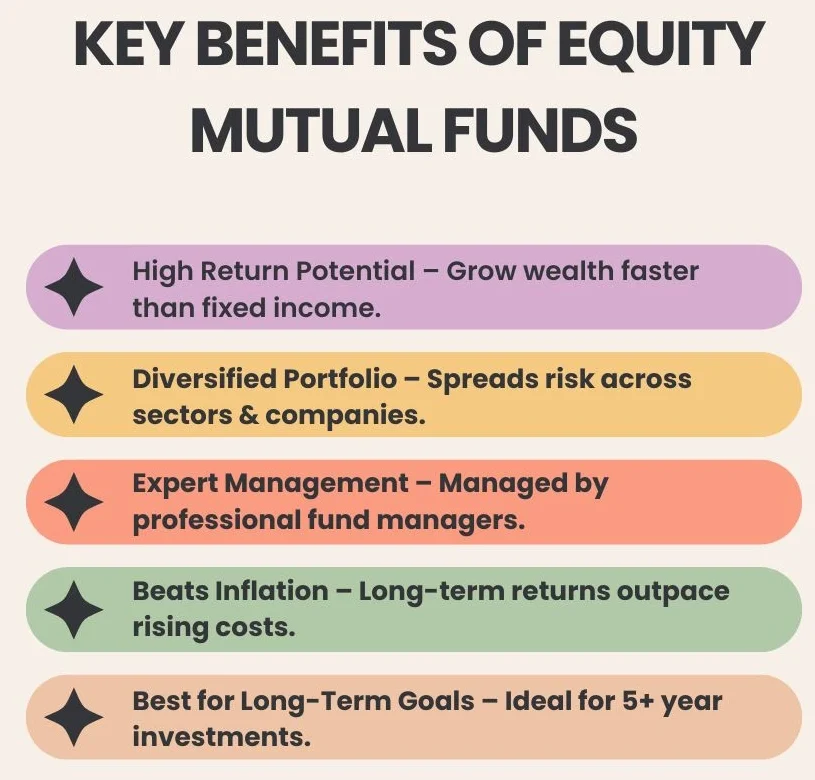Table of Contents
ToggleEquity Mutual Funds – Investing is similar to constructing a bridge from your current to a safe, richer future—and equity mutual funds can be the expressway. Among the mutual fund schemes in India, they stand out for their ability to offer higher returns and long-term growth. By combining money to invest in a diversified basket of company stocks, you allow yourself to catch the wave of growth of the stock market. Sure, they are more risky than debt funds, but to those with foresight and patience, returns can be life-changing. In this blog, we’ll reveal how equity funds work, their advantages, and why they can drive you to financial independence.
Getting to Know the Fundamentals of Equity Funds
An equity mutual fund is a mutual fund that invests mostly in equities or shares of companies. A professional fund manager manages the fund, who picks and keeps the portfolio to meet the investment goal.
The investment in equities typically exceeds 65% of the total assets of the fund. With greater exposure to equities, the returns are heavily correlated with the performance of the market.
Equity Capital Meaning
Before explaining in detail, let us understand the equity capital first. Equity capital is the funds provided by the owners or shareholders of a company. As you invest in an equity mutual fund, indirectly, you have a portion of this company’s assets through your investment.
This ownership also entitles you to a share in the profit (in the form of capital appreciation) and, at times, in dividends.
Advantages of the Equity Market for Investors
Investing in equity mutual funds provides various advantages that match the advantages of the equity market:
- Chances of Higher Returns – Equity Mutual funds have topped most fixed income instruments, such as treasury bills or government securities, historically over the longer run.
- Diversification – Your investment is distributed over different sectors and companies, minimizing company-specific risks.
- Professional Management – An expert fund manager takes care of all the investment decisions, giving you a respite from the drudgery of continuous market monitoring.
- Beating Inflation – Long term, equity schemes can generate returns higher than inflation, assisting in actual wealth generation.
- Tax under Section 80C – Certain equity schemes, for instance, Equity Linked Savings Schemes (ELSS), are exempt under Section 80C of the Income Tax Act up to a maximum amount of ₹1.5 lakh in a year.
Difference between Equity and Debt Mutual Funds
The difference between equity and debt mutual funds is crucial to align your investment with your objectives:
| Feature | Equity Mutual Funds | Debt Mutual Funds |
|---|---|---|
| Major Investment | Equity shares in firms | Bonds, government securities, invest in fixed income schemes |
| Risk Level | High (market-linked) | Lower (stable returns) |
| Returns | Higher potential, volatile | Lower potential, steady |
| Best For | Long-term growth | Short-term or conservative investor |
Equity mutual funds are geared towards capital appreciation, and debt funds are focused on producing consistent returns with lower risk. Each can be included in an asset allocation portfolio according to your investment horizon and total return objectives.
Types of Equity Mutual Funds
Various mutual fund schemes in India qualify as equity, each being formed for a specific reason:
1. Large-Cap Funds – Invest in India’s top 100 companies, with stability, consistent returns, and lower volatility than in smaller sections.
2. Mid-Cap Funds – Investors buy stocks in companies ranked from 101–250; mid-cap funds can afford to take on a distinctly higher level of risk with possibilities of even higher returns than large-caps.
3. Small-Cap Funds – Investors buy small firms in earlier stages of development but with significant growth potential; however, these shares are subject to much greater and unpredictable price and market volatility.
4. Multi-Cap Funds- Investor buys shares across all three cap sizes for an overall balance of exposure. The investor achieves price stability, but if there are many concurrent price declines, growth quality, or survivability, for example and the investor assumes risk afterward.
5. Sector/Thematic Funds- invest in more or less concentrated industries or thematic exposure. The investor is purchasing generally high-risk stocks in one particular industry with a very targeted opportunity.
6. ELSS- Tax Saving / Equity Linked Savings Scheme – tax-advantaged equity mutual funds with 3-year lock-in provisions under Section 80C.
Risk Appetite and Investment Horizon
Your investment in equity mutual funds must be aligned with your risk tolerance and investment time horizon.
- Short Term (<3 years) – Not for equity mutual funds because of market risks.
- Medium Term (3–5 years) – Can invest in balanced funds with equity content.
- Long Term (5+ years) – Equity Mutual Funds excel in the long run, compounding gains and riding out market ups and downs.
How to Invest in Equity Mutual Funds
At VSRK Capital, an AMFI AMFI-registered mutual Fund Distributor, we simplify the process of investing in equity mutual funds:
- Identify Goals – Determine your investment goal.
- Assess Risk Profile – Align funds with your risk tolerance.
- Select Scheme – Select from diversified mutual fund schemes in India.
- Invest – SIP mode or lump sum mode.
- Review Periodically – Track performance with the assistance of your advisor.
You can reach out to us on our Contact Page or check our Google My Business profile to begin your investment journey.
Tax Advantages of Equity Mutual Funds
Some equity mutual funds, such as ELS, are given tax deduction under 80C of the Income Tax Act. Apart from tax advantages, long-term capital gains in excess of ₹1 lakh are charged at a mere 10%, which makes them tax-efficient against most conventional instruments.
What to Remember Before Investing
1. Recognize the Risk – Equity mutual funds are market-sensitive, so anticipate temporary volatility in search of long-term gains.
2. Long-Term Thinking–Time is of the essence; equity investments take time to gain and bounce back from market falls with effectiveness.
3. No Certain Returns – Market trends influence performance, so aim for possible growth over the years, not temporary profits.
4. Differences in Asset Class – Compare returns, risk, and then determine if equity and debt funds are suitable before investing to ensure they align with your investing goals.
5. Skills of the Fund Manager – Investigate the fund manager’s education and experience, and invest in funds managed by those who have a proven capability and documented consistency, and reputable risk habits.
Final Thoughts
Equity mutual funds are a potent wealth-cumming tool if employed tactically. They provide access to the growth of the economy, the advantages of the equity market, and an opportunity to be part of India’s corporate success stories.
Whether you’re an old hand or a beginner, an association with VSRK Capital guarantees professional guidance, personalized advice, and a way to fulfill your financial aspirations.
FAQs
Equity capital refers to money provided by shareholders to a business. When you purchase an equity mutual fund, you own indirectly some portion of this capital.
Equity funds focus primarily on stocks, for capital appreciation over the long term, while debt mutual funds focus mostly on fixed income, like bonds and government securities, to generate a regular stream of income.
No, although ELSS funds qualify for 80C deductions. More than ₹1 lakh long-term gains are taxed at 10%.
Equity funds are ideal for long-term goals. In case of short-term needs, debt or hybrid ones should be thought of.





